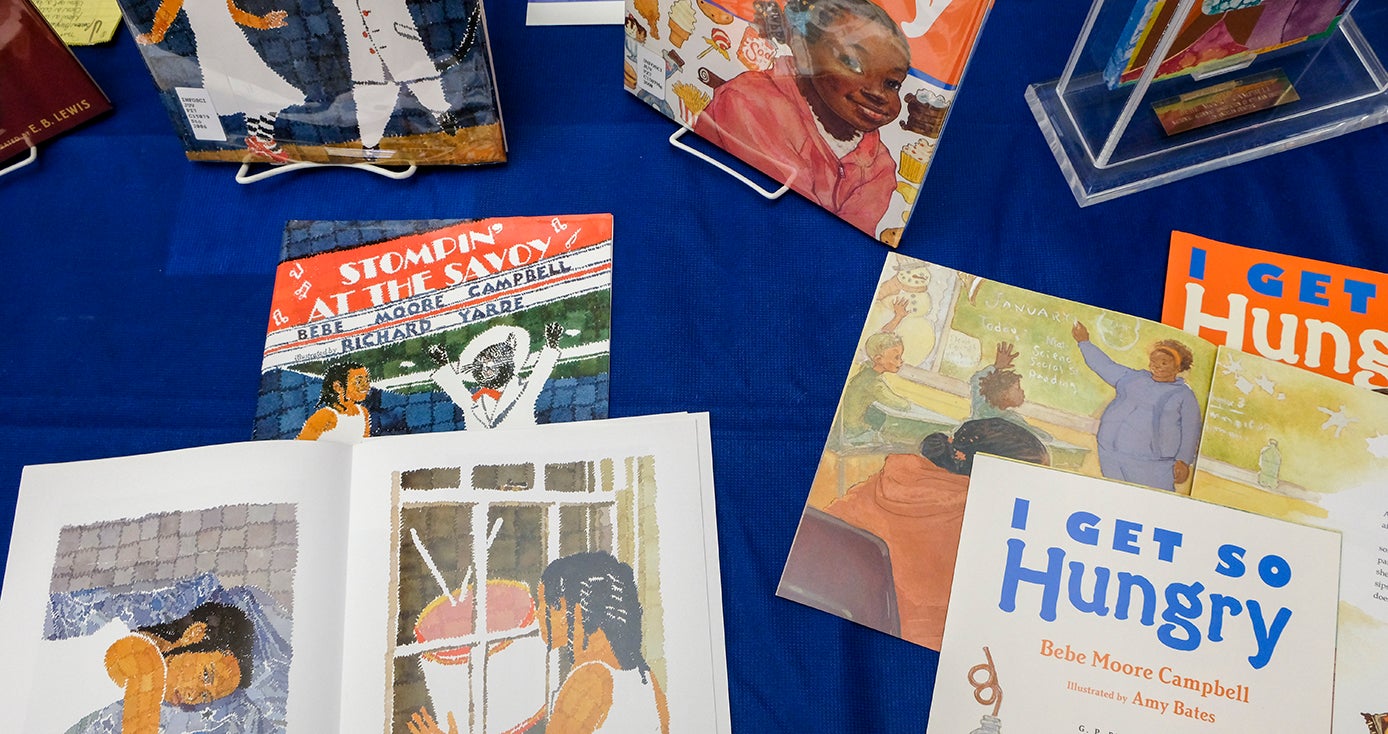
Subscribe to Pittwire Today
Get the most interesting and important stories from the University of Pittsburgh.Archives illuminate the life and creative process of a Pitt alumna, author and former trustee

Best-selling author and Pitt alumna Bebe Moore Campbell explored racial justice, childhood obesity and the tensions in friendships between Black and white people; she shared the stigma of mental illness and memories of the sweet summers she spent with her father in North Carolina.
Campbell (EDUC ’71), who died of complications of cancer in 2006, donated her archives to Pitt. They open a door into the disciplined, joyful life of a professional young writer ready to make her mark on the literary universe.
During an October panel discussion to celebrate the archives’ release, Campbell’s former editor, Adrienne Ingrum, said the writer pushed against racial stereotypes. She reminded listeners that it was important to keep Campbell’s historical and literary contributions in the public eye so the significance of the work does not recede — as happened with the work of noted writer Zora Neale Hurston before Alice Walker brought renewed visibility to Hurston’s work.
Campbell wrote novels, nonfiction, children’s books and memoirs. She also wrote two radio plays and contributed articles to The New York Times, The Los Angeles Times and to such national magazines as Essence and Ebony. She was a frequent contributor and commentator on National Public Radio.
Ingrum worked with Campbell on the much-heralded memoir, “Sweet Summer: Growing Up With and Without My Dad,” published in 1989, as well as most of her novels. Just as Hurston documented the lives of Black people in the early 1930s, Campbell’s work is a reflection of the time in which she lived. She captured the historical and cultural contexts, Black expressions, and moods of the 1980s, ’90s and early 2000s.
Campbell’s work should be digitized, Ingrum said, so it is more accessible and available to become part of the current literary dialogue in colleges and in literature courses. Before Hurston’s work was rediscovered, it had faded into obscurity. “We’re not letting that happen to Bebe,” said Ingrum.
Campbell, a former University of Pittsburgh trustee, came to Pitt from Philadelphia in 1967 and graduated in 1971 with a degree in elementary education.
The former teacher kept copious notes throughout her life, which fill 29 boxes of materials, gifted to the University of Pittsburgh Library System by her husband, Ellis Gordon Jr. Her tour itineraries show the many social engagements and readings she made to support her work. One week she would be paid $10,000 for a presentation at Johns Hopkins University; the next she might accept $150 for speaking to a small social club in Philadelphia.
She kept “brain storms” of promotional ideas on note cards. Her calendars are packed with business appointments, yet she kept open dates to celebrate anniversaries, family reunions and her daughter’s first day of class.
Mountains of receipts and records reveal the administrative end of publishing. Contracts show “Singing In the Comeback Choir,” one of her most successful works, earned her a payment of $333,000. Before royalties, she was paid $35,000 for “Successful Women, Angry Men" and $40,000 for “Sweet Summer,” which originally had the working title “Fruit of the Loom.” Her work went international and she garnered contracts to have some of her novels published in French and Polish. In 2005, O, the Oprah magazine, paid her $1,000 to write about an “aha” moment.
David Grinnell, coordinator of Archives and Special Collections for the University Library System, said the collection shows Campbell’s rich creative process. For him, the jewels of the collection are letters from fans and friends that are “revealing and rewarding.” She kept her prayer lists, documenting whom she prayed for and why. Campbell often wrote longhand and there are dozens of her speeches in various stages of draft.
Her engagement with creating awareness and support of mental illness is found in the collection. Campbell had a family member with bipolar disorder. The title of her last novel, in which she addressed the disease, is “72-Hour Hold,” which refers to the period the law allows an individual to be detained involuntarily before he or she can sign out of a psychiatric facility. She also wrote about how people of color carry a double burden: the stigma of race and the disquiet of feeling not in control of their mind.
Campbell wrote the children’s book “Sometimes My Mommy Gets Angry,” published in September 2003, which won the National Alliance on Mental Illness (NAMI) Outstanding Literature Award. The book tells the story of a little girl being reared by her mentally ill mother. Campbell was a member of the National Alliance for the Mentally Ill and founded a NAMI chapter in Inglewood, California. Her first play, “Even with the Madness,” a work that revisited the theme of mental illness and the family, debuted in New York City in June 2003.
For Campbell, mental illness was personal. But perhaps wasn’t her toughest battle.
Her records also chronicle her own failing health and her spirit to fight back. One calendar shows she was scheduled to give a keynote address at Pitt in 2005. She was too ill to deliver it, due to brain cancer. As her disease progressed, she kept dozens of charts listing her medicine regimen, documented her loss of physical functioning and — in a particularly harsh blow for a writer — her diminishing capacity to tell stories. Campbell had to practice elementary sentence composition in a struggle to stay coherent.
“She knew the value of her stories,” said Linda Wharton Boyd, former president of Pitt’s African American Alumni Council and a friend Campbell met at Pitt. Now a communications executive in Washington, D.C., Wharton Boyd said Campbell “created characters where Black women and, still, all kinds of people could find themselves in her work. She has a special place in literary history and a special place in our hearts.”
Accessing the Bebe Moore Campbell collection
More information on Bebe Moore Campbell and a listing of the contents of her archive is available on the Archives and Special Collections website.
Faculty, staff, students and the general public can visit the collection, stored at the Archives Service Center in Point Breeze, just off campus at 7500 Thomas Blvd., Pittsburgh, Pennsylvania, 15208.
The center is open Monday through Friday, 9 a.m.-4:45 p.m., but hours vary due to holidays.
Visitors can take cell phone and camera images of material. Use of tripods must be approved. Archivists can also scan and make copies for a small fee.
No appointment is necessary, but making an appointment helps archivists to have material assembled for your research.
For more information, call 412-648-3232 or visit the library system website.



